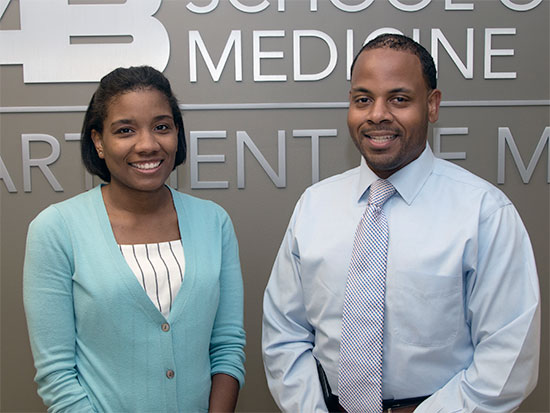 Latesha Elopre, M.D., and Gregory Payne, M.D., Ph.D.In a historic first, two researchers in the University of Alabama at Birmingham Department of Medicine have been chosen as finalists for the 2017 Harold Amos Medical Faculty Development Program.
Latesha Elopre, M.D., and Gregory Payne, M.D., Ph.D.In a historic first, two researchers in the University of Alabama at Birmingham Department of Medicine have been chosen as finalists for the 2017 Harold Amos Medical Faculty Development Program.
“Having not one, but two Amos Scholars in the same year at our institution is a testament to the excellence that comes from a diverse training environment,” said Selwyn M. Vickers, M.D., distinguished alumnus of the program and UAB School of Medicine senior vice president and dean. “I am proud of their hard work and passion for science, and I look forward to hearing about the exciting research they will be able to conduct thanks to this award.”
Latesha Elopre, M.D., assistant professor in the UAB Division of Infectious Diseases, and Gregory Payne, M.D., Ph.D., fellow in the UAB Division of Cardiovascular Disease, were selected for the prestigious AMFDP program of the Robert Wood Johnson Foundation. Each was chosen as finalists to receive one of 14 four-year career development awards given to historically disadvantaged health professionals who are committed to developing careers in academic medicine, as well as serving as role models for future students and faculty of similar backgrounds.
Elopre’s research focuses on developing an intervention to increase uptake of HIV pre-exposure prophylaxis among urban and rural black women.
“I wouldn’t have dreamed of applying without the encouragement of my division, department and mentors,” Elopre said. “This is really a reflection of their support.”
Payne’s work with novel mechanisms of inflammation in cardiovascular disease and cardiac transplant rejection is sponsored by the American Heart Association.
“It’s a privilege to become an AHA-AMFDP Scholar,” Payne said. “The award is due in large part to the outstanding, interdisciplinary mentorship I’ve received at UAB. This opportunity provides me an exciting chance to represent UAB’s strong academic community and to learn from an illustrious group of investigators.”
Harold Amos, Ph.D., was the first African-American to chair a department at Harvard Medical School. Amos worked to recruit and mentor countless numbers of minority and disadvantaged students to careers in academic medicine and science. Thanks to him, the program has a legacy of nearly 300 alumni who have gone on to chair departments, become leaders within the National Institutes of Health, and make invaluable contributions to biomedical research, health services research and clinical investigation.